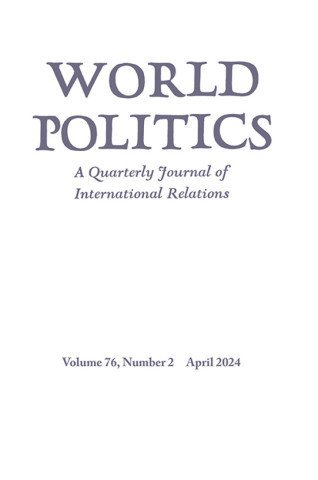Group Ties amid Industrial Change
IF 2.5
1区 社会学
Q1 INTERNATIONAL RELATIONS
引用次数: 0
Abstract
Abstract Coethnics often work in the same industries. How does this ethnic clustering affect individuals’ political loyalties amid industrial growth and decline? Focusing on migrant groups, the author contends that ethnic groups’ distribution across industries alters the political allegiances of their members. When a group is concentrated in a growing industry, economic optimism and resources flow between coethnics, bolstering migrants’ confidence in their economic security and dissuading investments in local political incorporation. When a group is concentrated in a declining industry, these gains dissipate, leading migrants to integrate into out-groups with greater access to political rents. Analyses of immigrants near US coal mines in the early twentieth century support this theory. The article shows how ethnic groups’ distribution across industries shapes the evolution of group cleavages and illuminates how decarbonizing transitions away from fossil fuels may reshape identity conflicts.产业变革中的集团关系
摘要Coethnics经常在同一行业工作。在工业增长和衰落的过程中,这种种族聚集如何影响个人的政治忠诚度?以移民群体为中心,作者认为,种族群体在各个行业的分布改变了其成员的政治忠诚。当一个群体集中在一个不断发展的行业时,经济乐观主义和资源在男女之间流动,增强了移民对经济安全的信心,并劝阻了对当地政治融合的投资。当一个群体集中在一个衰落的行业时,这些收益就会消散,导致移民融入更容易获得政治租金的外部群体。对20世纪初美国煤矿附近移民的分析支持了这一理论。这篇文章展示了种族群体在行业中的分布如何影响群体分裂的演变,并阐明了从化石燃料转向脱碳可能如何重塑身份冲突。
本文章由计算机程序翻译,如有差异,请以英文原文为准。
求助全文
约1分钟内获得全文
求助全文
来源期刊

World Politics
Multiple-
CiteScore
8.40
自引率
0.00%
发文量
24
期刊介绍:
World Politics, founded in 1948, is an internationally renowned quarterly journal of political science published in both print and online versions. Open to contributions by scholars, World Politics invites submission of research articles that make theoretical and empirical contributions to the literature, review articles, and research notes bearing on problems in international relations and comparative politics. The journal does not publish articles on current affairs, policy pieces, or narratives of a journalistic nature. Articles submitted for consideration are unsolicited, except for review articles, which are usually commissioned. Published for the Princeton Institute for International and Regional Affairs
 求助内容:
求助内容: 应助结果提醒方式:
应助结果提醒方式:


